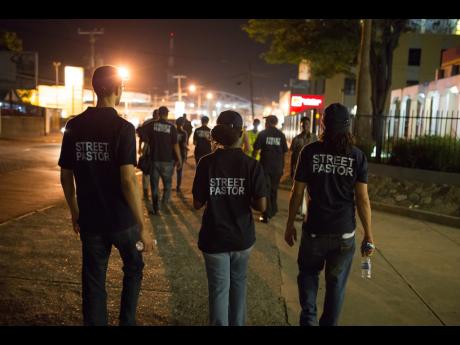Taking the church to the streets - The Street Pastors initiative, born in Jamaica, grown in the United Kingdom, and now back a yard
As the world marks Youth Month, The Sunday Gleaner, in association with the World Bank, presents a series looking at the challenges and triumphs of the next generation of Jamaicans.
Getting the congregation out on to the streets could be the most effective way for the Jamaican church to help prevent violence. That's the experience of the United Kingdom-based 'Street Pastors', who have won success across the Atlantic with an approach that was inspired by a Jamaican predecessor that could not be sustained.
Now that is changing. Each Friday 8 p.m. to 12 a.m., Operation Save Jamaica hits the street, not evangelising, but rather seeking to help persons in the vicinity of the busy Half-Way Tree Transport Centre.
A typical night will see volunteers helping people with anything from accessing certain public services to preventing a suicide. Street Pastors are now readying to deploy in their first inner-city community, August Town in St Andrew.
The genesis of Street Pastors was the realisation that preaching to the converted was unlikely to have any direct impact on the youths outside that space.
BUILDING CREDIBILITY
"We realised that we were within the church walls but weren't having an impact, but when we came out we became more relevant. There was credibility because we started helping with small projects. They weren't huge projects but they were helping people turn away from their other (criminal) sources of income," says Richard DeLisser, founder of Street Pastors in Jamaica.
It was not long after that a British pastor, Les Issac, visited Jamaica and took the approach back home. There Issac and his colleagues formed what he calls a 'Holy Trinity' of police, government and the church. All are influential actors within inner cities but needed to combine in order to have greater effect.
"We found that these three were not doing collaboration, were not doing joined-up thinking, they weren't complementing, and in some cases weren't even talking to each other. So that was a thing that we felt was important for us to bring together because none of us have all the capacity, all the resources to make that massive impact," said Issac during a visit to Jamaica.
Street Pastors in the UK has grown from an initial 18 volunteers to 20,000 today, and has come to be seen as a valuable partner by police forces and councils.
TEMPLATE AND GUIDELINES
It has built a template, including guidelines, that is now being used in Jamaica, albeit with some local modifications. Applicants here have had to complete 54 hours of training, including two full days of conflict resolution, leading to a current complement of 120 street pastors.
"The training itself is pretty intense but it really does expand your ability to understand people and to serve within and outside of church," says national coordinator Rhea Alert.
"A lot of people who go through the training say, 'Wow! This is helping my relationship at home, how I deal with my kids, how I deal with people in my workplace'," said Alert, who is the only full-time employee.
For now, Street Pastors depends heavily on private and church donations. Interest among Jamaican church groups is growing, while a future project will look to replicate the model inside Jamaican schools.
- The World Bank's Next GENDERation Initiative has been working to help young people challenge gender stereotypes that lead to violent behaviour. It is a partnership between the ministries of Education, Youth and Culture, and National Security, the Bureau of Women's Affairs, the Planning Institute of Jamaica, the World Bank and the Inter-American Development Bank.


